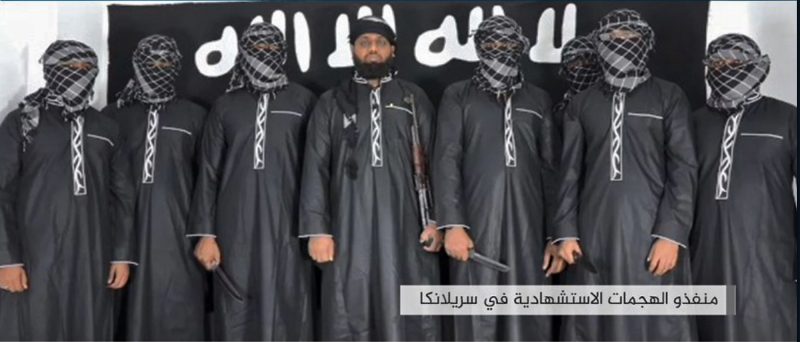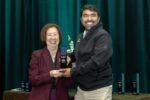Islamic State group claims Sri Lanka suicide bombings
The Islamic State group published a picture of eight men it said were behind the attacks in Sri Lanka (HO)
Colombo (AFP) – The Islamic State group on Tuesday claimed responsibility for a devastating series of suicide attacks against churches and hotels in Sri Lanka that killed more than 320 people.
The claim, accompanied by a photo and video of the men the group said had unleashed the carnage, emerged more than two days after the near-simultaneous blasts ripped through three high-end hotels popular with foreigners and three churches packed with Christians celebrating Easter.
Sri Lanka’s government had said initial investigations suggested the attack had been carried out as “retaliation” for shootings at two mosques in New Zealand last month that killed 50 people.
Authorities in Colombo had already pointed the finger at a little-known local Islamic extremist group called National Thowheeth Jama’ath (NTJ), but said they were investigating whether they had international support.
“Those that carried out the attack that targeted members of the US-led coalition and Christians in Sri Lanka the day before yesterday are Islamic State group fighters,” IS propaganda agency Amaq said in a statement.
The group later gave the noms de guerre of seven people it said were behind the “blessed attack” that targeted Christians during their “blasphemous holiday”.
Amaq also released a photo of eight men it said were behind the blasts. Seven of them had their faces covered and three of them held knives.
The authenticity of the image and video could not be independently verified, and the reason for the discrepancy in the reported number of attackers was not immediately clear.
– Brothers involved? –
Sri Lankan police sources told AFP that two Muslim brothers, sons of a wealthy Colombo spice trader, blew themselves up at the Shangri-La and the Cinnamon Grand hotels.
The Kingsbury hotel in the capital was the last one hit.
A fourth attack against a hotel on Sunday failed, sources also told AFP, though it was not immediately clear if the bomber’s explosives had malfunctioned or he had chosen not to detonate them.
He later blew himself up when police tracked him to a lodging in the capital.
Police have detained at least 40 people as they investigate the worst act of violence in the South Asian island nation since a civil war ended a decade ago.
But Prime Minister Ranil Wickremesinghe said police were hunting for more suspects at large, including some armed with explosives, and that further attacks were possible.
“We are trying to apprehend them,” he said.
The government has imposed a state of emergency, giving police and the military special powers, including the ability to arrest suspects without a court order.
– ‘Hard to bear’ –
The country observed a national day of mourning Tuesday, beginning with a three-minute silence, as the bereaved began to bury their dead.
Flags were lowered to half-mast on government buildings, and liquor shops were ordered closed for the day.
More than 1,000 people gathered at St Sebastian’s Church in Negombo, north of the capital, which was among those devastated in the blasts, to pay tribute to the dead.
An elderly man wept uncontrollably by the coffin bearing the body of his wife, while relatives of other victims stood aghast and silent.
Coffins were carried into the church grounds one by one for services, and then to a newly-established cemetery on church land.
“It’s very hard to bear,” said Father Suranga Warnakulasuriya, who had come from another parish to help conduct funerals.
The attacks were the worst ever against the country’s small Christian minority, who make up just seven percent of the 21 million population.
Officials are investigating why more precautions were not taken after an April 11 warning from Sri Lanka’s police that a “foreign intelligence agency” had reported the NTJ was planning suicide attacks on churches.
Government spokesman Rajitha Senaratne said the warning was not passed on to Wickremesinghe or other top ministers.
CNN reported that Indian intelligence services had passed on “unusually specific” information in the weeks before the attacks, and that at least some of it came from an IS suspect in their custody.
President Maithripala Sirisena, who is also defence and law and order minister, said he will carry out a complete reorganisation of the security forces and the police in the wake of the attacks.
“I hope to make major changes in the leadership of the security forces in the next 24 hours,” Sirisena said in a nationwide address.
– Identifying the dead –
Work was continuing to identify foreign victims in the blasts.
A Danish billionaire lost three of his children in the attacks, a spokesman for his company said.
Eight Britons, 10 Indians, four Americans and nationals from Turkey, Australia, Japan and Portugal, were also reported killed.
The United Nations said at least 45 children, Sri Lankans and foreigners, were among those who lost their lives.
Of the three churches targeted, two are in the Colombo region and one is in the eastern city of Batticaloa.
Ethnic and religious violence has plagued Sri Lanka for decades. A 37-year conflict with Tamil rebels was followed by a more recent upswing in clashes between the Buddhist majority and Muslims.
The attacks have sparked local and international outrage, and have been condemned by Sri Lankan Muslim groups.
Disclaimer: Validity of the above story is for 7 Days from original date of publishing. Source: AFP.


